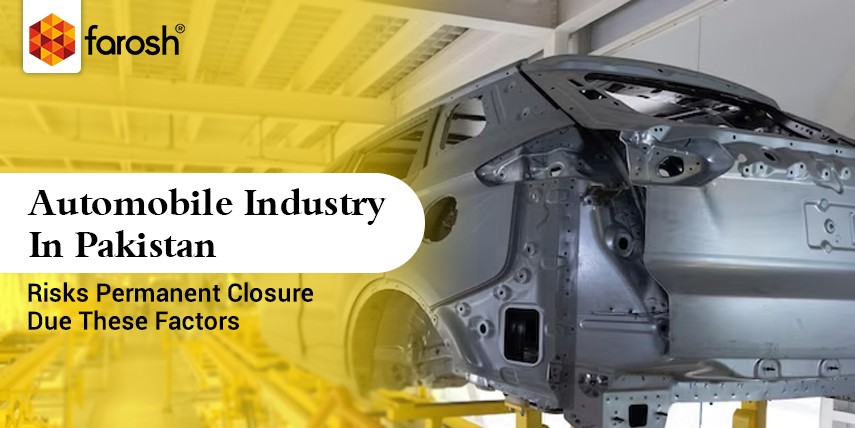

Jul 03, 2023
708
The automobile industry in Pakistan has been facing various difficulties, but none are as serious as the possibility of its permanent collapse. Local automakers are finding it harder and harder to stay viable due to growing expenses, a faltering economy, and increased competition from overseas markets. The once-thriving industry in Pakistan faces an uncertain future, leaving experts to wonder if it will ever reclaim its former splendor. Today, we will examine the numerous factors contributing to the industry's downfall and the possible effects of its eventual shutdown. The stakes are significant, with implications for both the national economy and employment rates. Join us as we explore the current situation of the automotive sector in Pakistan and highlight the obstacles it must overcome to survive.
Overview of Pakistan's automobile industry
The first auto assembly facility was constructed in Pakistan in the 1950s, and the country has a long history in the vehicle sector. It has developed greatly throughout time, with numerous regional manufacturers producing a wide variety of automobiles. The industry has been essential to the nation's economic growth, providing numerous automobile industry jobs in Pakistan and advanced technology. However, the industry has recently been dealing with significant problems that put its very survival in jeopardy.
Prime challenges faced by the automobile industry

The primary challenge faced by the automobile industry in Pakistan is as follows:
· Rising costs of production and raw material
· High taxes and duties
Rising costs of production and raw material
According to the latest Pakistani automobile industry analysis 2023 car manufacturers have no choice but to increase the prices of their vehicles. Purchasing a new car seems impossible for the nation, as the prices have skyrocketed. When asked about it, the manufacturers revealed that the main reason for a dramatic surge in prices is the rising costs of raw materials. Materials such as steel are being imported at extravagant prices. Which forces the companies to hike the price of automobiles in Pakistan. Because of such factors, Suzuki shut down its plant due to low inventory.
High taxes and duties
One would think that raw materials could be the prime reason behind the high car prices but that is not the only reason. According to many new car manufacturers in Pakistan, the companies who import automobiles had no choice but to increase the prices since the government imposed heavy taxes and duties on imported vehicles.
Other factors contributing to the uncertain future

Lack of supportive policies from the government
There are a number of reasons why Pakistan's auto sector has an uncertain future. First, the industry has been significantly impacted by government policy. Manufacturers find it challenging to make long-term plans as a result of the policies' erratic nature and constant change. Also, it is impossible to overestimate the effect of government policy on the automobile industry in Pakistan. As mentioned early, local manufacturers find it challenging to compete with global names due to the hefty taxes and customs levied on imported parts and cars. Additionally, the absence of long-term strategies and a clear path for the industry's expansion have made investors apprehensive and hampered the sector's development even more.
Decline in demand and changing consumer preferences
The fall in demand and shifting consumer preferences are two more key factors putting Pakistan's vehicle industry's future in doubt. Consumers are becoming more frugal with their spending as a result of the economic slowdown and rising prices. As a result, there is much less demand for new cars, which has an effect on the sales and profitability of regional manufacturers. Additionally, consumer preferences have changed in favor of cleaner, more ecologically friendly, and fuel-efficient automobiles, which the local automotive sector has found difficult to supply.
Competition from imported vehicles
Imported vehicles in Pakistan are a serious competitor for the domestic auto sector. A very competitive market has resulted from the surge of imported cars, especially from nations like Japan. These imported cars are a more alluring option for customers thanks to their superior quality, cutting-edge amenities, and affordable cost. Local manufacturers have been under pressure from this competition to increase their offerings, adhere to international standards, and increase their sales. Believe it or not, most of the top 10 car companies in Pakistan are from China, Japan, and South Korea.
Potential consequences of permanent closure

According to PAMA- Pakistan Automotive Manufacturer Association repercussions could be severe if Pakistan's automobile industry is forced to permanently close. The employment rates would suffer significantly, to start with. There are many skilled and unskilled employees employed by the sector now, thus its closure would result in significant employment losses. In addition to having an impact on people's livelihoods, this would also have repercussions for the economy as a whole. Additionally, the country would have to rely more on imported vehicles, which would result in a loss of foreign exchange profits. Due to the sensitive situation, rumors started circling around that Toyota Indus may stop operating in the country. But soon the rumors were put to rest when Toyota Indus CEO, announced that the company is all set to release its first locally assembled Hybrid SUV.
Possible solutions to revive the industry

To revive the automobile industry in Pakistan, the following measures need to be taken:
· The government should offer tax rebates and other assistance to regional manufacturers.
· To foster a climate that is conducive to business, a stable and consistent policy framework must be implemented
· The government should also make investments in research and development to encourage creativity and technological progress
Such changes will make local manufacturers stronger to compete with international competitors.
How to achieve a stable future for the automobile industry in Pakistan?
Innovation and technology play a crucial role in the revival of the automobile industry in Pakistan. Local manufacturers need to invest in research and development to introduce new and advanced features in their vehicles. This would not only attract consumers but would also help improve the industry's competitiveness. Furthermore, the adoption of electric and hybrid vehicles can contribute to a greener and more sustainable future for the industry.
It is concerning that Pakistan's auto sector has an unclear future. Numerous issues the sector is dealing with threaten its survival. However, there is still hope for its resurgence with the appropriate regulations, incentives, and investments. To ensure that the local car industry can overcome its current challenges and reclaim its former glory, the government, industry stakeholders, and consumers must work together to support and nurture the sector. Only then can the sector open Pakistan's doors to economic expansion, job creation, and technical improvement.
